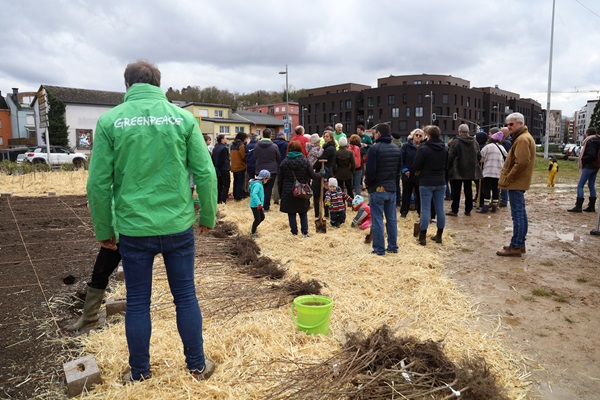 Credit: Anaïs Hector
Credit: Anaïs Hector
Greenpeace Luxembourg has recently planted its second micro-forest, this time in Esch-sur-Alzette on rue Helen Buchholtz, to mark the occasion of the group’s founding in the town 40 years ago.
The micro-forest was planted over an area of 200m2, using the Miyawaki method which consists of planting three trees per m2 on prepared soil. Speaking to Chronicle.lu, the Director of Greenpeace Luxembourg, Raymond Aendekerk, gave more details about this new planting method and its benefits. The space used for this mini-forest plantation was one-quarter of a temporary parking lot. Around 150 Greenpeace volunteers involved first had to remove around 30 cm of stones and gravel and bring in new soil from a nearby region. In this case, humus and organic matter were used, mixed by Minett Kompost, a local facility based in the south of Luxembourg using refuse from nearby municipalities’ organic waste bins to create compost.
Next, the volunteers planted the area densely: three plants per m2, leaving it up to nature to see which will end up surviving and thriving. Lastly, the newly planted forest was mulched with straw. The forest should be left to its own devices now, however, Director Aendekerk noted. While a little extra water may be required depending on how hot the summer will be, he added that he was confident this may not strictly be necessary. The forest Greenpeace planted in Mertzig last spring progressed well on its own without watering, he noted.
The Miyawaki method was used because it can be planted in small, urban areas and create more biodiversity, visual serenity and a sound screen but also because it helps fight the overheating of towns. Additionally, such dense, diverse mini-forest areas may help retain more water in the earth and improve the soil’s quality. This project was launched in cooperation with the municipality of Esch-sur-Alzette and thanks to the support of more than 250 Greenpeace donors, who offered a piece of forest to the person of their choice in return for a donation of €30. Nevertheless, Raymond Aendekerk emphasised that planting forests is not the main focus of the group and he drew the link to deforestation in other countries such as Brazil and Siberia. He concluded that this project aimed to raise awareness of the importance of biodiversity and reforestation. Several Luxembourg municipalities have expressed an interest in the evaluation of the mini-forest projects and may follow suit in future, he noted.








